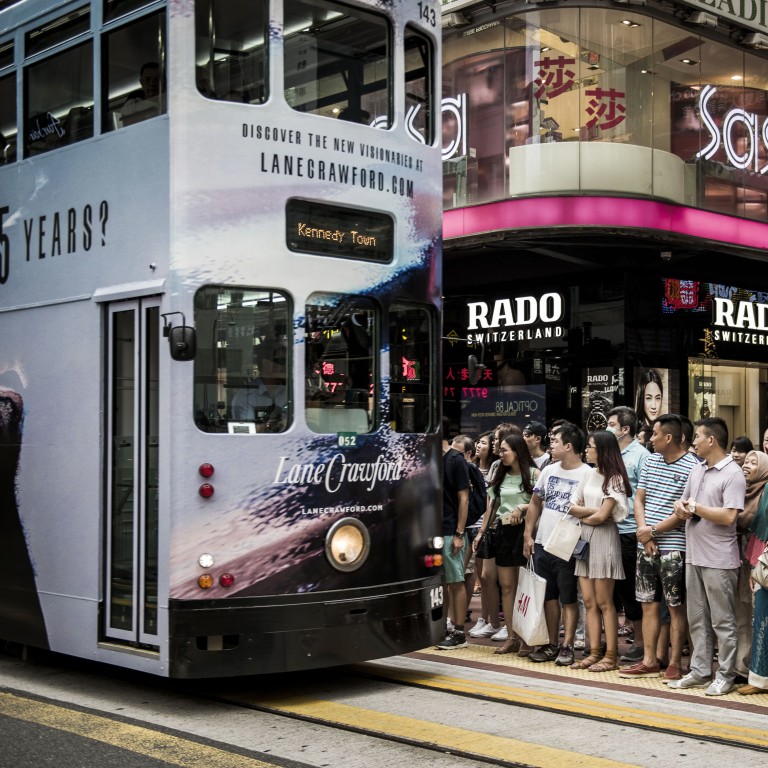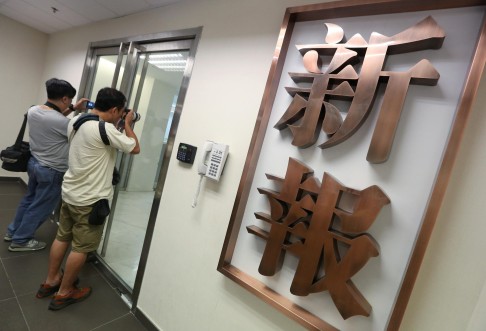
Letters to the Editor, August 22, 2015
It was a shock to hear the proposal to cut the Hong Kong Tramway's rail zoning in the Central District from Jubilee Street to Ice House Street. It is more surprising to hear the reason is to improve the traffic for the busy Central District because the tramway's rails cover 30 per cent of the road surface, and that the MTR already covers the route.
I object to this proposal to replace the tram as a means of transportation. The aim should be to improve on it, not kill it. The tram company has been making a lot of improvements to its rail system, making the tram faster and safer. It is now trying to introduce air-conditioned tram cars.
Elimination of a part of the tram rail system means taking away the direct service of the tram from Western District to Central District, and beyond to Wan Chai, making it less convenient for commuters. Keep in mind that the tram has a large ridership and that its charge is but a fraction of what the MTR charges.
The MTR is by no means a good substitute for the tram service, which offers shorter stops and does not require commuters to go up and down escalators and stairs. Offering effective street-level transportation, the Hong Kong Tramway takes a lot of people to work.
Many historical cities are still able to make good use of the tram as a means of transport.
The government should help improve the tram routing system, making further integration of the tram service to other means of transport, not kill it.
We often read of complaints about poor customer service. For a change, we should also praise those who offered good service.
On August 5, there was a case of suspected gas leakage at my home. My wife phoned up the gas company's 24-hour emergency hotline at about 9pm to ask for help.
After a brief exchange, the service representative ensured us that the gas main had already been switched off and then tried to arrange for a follow-up house call within two hours.
In less than 10 minutes, their serviceman phoned and confirmed his visit half an hour later. The visit was made, and the leak turned out to be a false alarm.
The next morning, the gas company called to see if our problem had been properly fixed. Well, I must say that we have not received such thorough and quality service from any organisation for a long, long time.
Keep up the good work, Towngas.

I am saddened that a number of newspapers in Hong Kong are facing difficult times. The , in particular, folded last month after decades of publication.
This has once again sparked a heated debate on whether newspapers still have a place in today's Hong Kong.
In the past, when radio and television were not common in society, there were far fewer ways to be entertained. People enjoyed reading serial novels and comics published in newspapers.
And newspapers were a vital tool for people to know what was happening in the city and round the world.
Today, many of us get our news from online portals and social media. As a result of fast-developing technologies, newspapers have become an outdated way to convey news and provide entertainment.
This rise of online and mobile platforms, in addition to free tabloids, has caused advertising revenues of traditional print media to decline.
In my opinion, however, although newspapers' entertainment function might have faded, they still keep us informed and remain invaluable in today's society.
They serve as a platform for members of the public to express different viewpoints. Investigative reports, editorials and commentaries with deep insights reflect newspapers' role as an advocate of good governance.
It can be said that newspapers are a defender of press freedom and free speech, which are key elements of a civil, democratic society.
Recently some Uber drivers were arrested by the Hong Kong police. I wonder why the police can take such swift action against Uber but do nothing against the illegal cross-border limo service. Is this limo service maybe a bit better "connected"?
Why are we withholding arrangements for double car licence plates to make it easier to travel to and from the mainland? Is it because some people make a lot of money out of renting out these plates or providing a limo service for those of us who do not have double plates?
I heard all the arguments that drivers from the mainland would be horrible on our roads. Well, make them redo their driving test in Hong Kong. This way, you can be sure that the day trippers will not take a car as it is too much hassle to take the test. The others will most likely fail, anyway.
Now I drive to Tuen Mun, park my car and take a taxi to Shenzhen Bay (as I am not allowed to park my car at Shenzhen Bay), then walk across the border and get into my mainland car parked just outside in the parking lot. Utterly ridiculous.
Nobody takes action against the cross-border limos, but now we see speedy action against Uber drivers. This smells like class "justice", where the better-connected do not get into trouble.
There is no doubt Hong Kong is a land of opportunities. I agree with Vicky Lui that local students should have priority should additional places in Hong Kong universities become available ("Make sure local students don't lose out", August 7).
Yet, they face ever fiercer competition from their mainland counterparts.
I have observed that mainland students work harder than Hong Kong students. They always strive for the best, and aim higher. There are outstanding and diligent Hong Kong students, of course, but, comparatively, mainland students tend to be more ambitious.
This should be a warning for Hong Kong students, who must clearly see their own strengths and weaknesses.
G. Bailey in the letter "World leaders ignoring the evidence" (August 7) asks if "anyone … can truthfully state that the sea level is so obviously rising that they feel threatened?" The 100,000 residents of Kiribati island and the 50,000 of the Marshall Islands can respond with a "yes".
He mentions a study that our planet will start cooling in 15 years "due to solar activity". Astronomers monitor sunspots and solar flares. They have a list of equations, and they let a computer crunch the data. He accepts a computer model which predicts global cooling, while rejecting computer models which predict global warming.
There is a common human tendency to believe what we want to believe.
I refer to the letter by Ndemio Stephane ("Gay rights simply not an issue in Kenya", August 17), concerning discrimination on the grounds of sexual orientation.
I cannot agree more that we should combat discrimination, but why exclude prejudices on the grounds of sexual preferences?
Several months ago, Hong Kong lawmaker Raymond Chan Chi-chuen was verbally harassed for his sexual orientation by two women on the MTR, which created an outcry in society.
Admittedly, advocacy of the rights of sexual minorities is controversial in Hong Kong. However, no matter what religious faiths we belong to and how we view sexual minorities, as civilised citizens, we have no excuse for being less than courteous and respectful of others.
Some Hongkongers still harbour misperceptions about sexual minorities.
I am not convinced that discrimination based on sexual orientation is not genuine discrimination. On the contrary, I reckon it is time we end such discrimination.
It is fine to have different views on the issue, but not OK to stigmatise homosexuals.
Many gay, lesbian, bisexual and transgender people struggle with their identities, and the crux of the lobby for gay rights is a demand for respect. When people learn to respect differences, society will become more cohesive. This will enhance the country's soft power and provide a boost to its economy. Respect and empathy in society are vital.
While different countries have enacted different laws regarding homosexuality, which should be respected, they must not be used to further discrimination in our day-to-day life.
Only with mutual respect can we create a society that is dynamic, harmonious and economically advanced.

